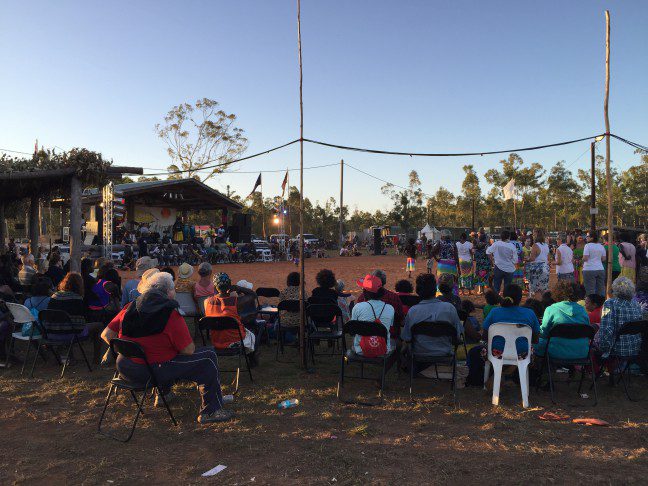This year Oxfam attended the Garma Festival held at Gulkula, a culturally significant site for the Yolngu people about 20km outside of Nhulunbuy in northeast Arnhem Land.
It was the 17th Garma Festival and a significant forum for discussing the state of Indigenous politics and policy within Australia. The issue on most attendees minds seemed to be modern day racism and the disgraceful behaviour of AFL crowds booing former Australian of the Year, Adam Goodes. It would seem that some sections of the Australian media and public still have more to learn when it comes to understanding Indigenous Australia and the issues of everyday racism.
In addition to racism, guest speakers and those attending the festival also discussed and debated various issues confronting Aboriginal and Torres Strait Islander peoples including constitutional recognition, economic development, the forced closure of remote Aboriginal communities, education, the role of Aboriginal and Torres Strait Islander rangers in managing Australia’s natural heritage and the impacts of climate change. There was also a celebration of Indigenous culture, with a host of cultural activities, bush walks, documentaries, and music.
Politicians from the Coalition, ALP, and the Greens presented and spoke at many of the key forums. While government representative Alan Tudge spoke of their commitment to Indigenous people via Prime Minister Tony Abbott, it would be fair to say that there is widespread frustration within political ranks at the state of Indigenous affairs.
ALP Senator Nova Peris was particularly frustrated at the lack of meaningful engagement governments of all persuasions have, and continue to deliver, when working with Aboriginal and Torres Strait Islander people.
A panel including Noel Pearson, Marcia Langton and Andrea Mason discussed the Empowered Communities report released earlier this year as the best means for improving the way in which governments engage with Aboriginal and Torres Strait Islander people. The report looks to outline a better way to address Indigenous disadvantage by placing more responsibility in the hands of Aboriginal and Torres Strait islander peoples.
A big feature of the festival is of course, traditional Yolngu dance and culture. Each afternoon people would take a seat around the Bunggul Ground and watch the different clans perform traditional dance and songs. It was an amazing privilege to be able to watch Yolngu culture being celebrated and shared – by young and old Yolgnu — with guests every day of the festival.
All of the Oxfam team had discussions with various politicians, academics, Aboriginal leaders, artists, producers, media, and people from other NGOs — too many to mention — but we added our voice, and showed our support to Aboriginal people and the Yolgnu.
There are many opportunities to follow up so we hope to tell you more in the weeks and months ahead.

